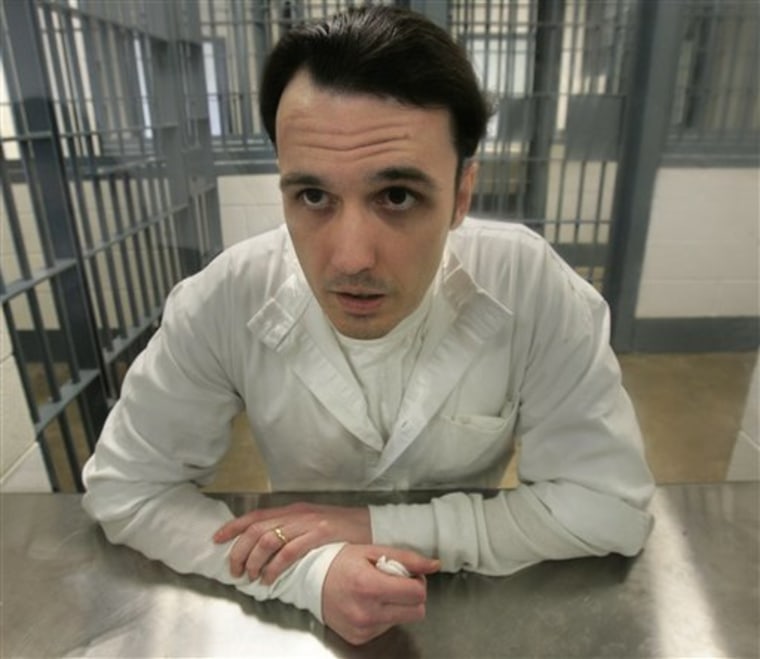The three men convicted in the grisly murders of three West Memphis Cub Scouts won new hearings Thursday to argue their innocence, more than 15 years after they were sent to prison despite scant physical evidence linking them to the crime scene.
The Arkansas Supreme Court ordered the hearings to decide whether new DNA analysis — and other evidence not introduced at the 1994 trials — could lead a reasonable jury to acquit death-row inmate Damien Echols as well as Jason Baldwin and Jessie Misskelley, who are serving life sentences.
The ruling was a major win for Echols, Baldwin and Misskelley, who are known to sympathizers as the West Memphis Three and have gained the support of celebrities as well as legal scholars who say they were wrongfully convicted. Echols has been on Arkansas' death row since 1994, when he was 20, after being convicted in the deaths of 8-year-olds Steve Branch, Christopher Byers and Michael Moore. The three boys were found beaten, nude and hog-tied in an area known as Robin Hood Hills in West Memphis.
"Damien is thrilled with the court's decision," said his wife, Lorri Davis. "It is the best news he has heard in his case in the 17 years he has been on death row."
Echols' attorneys called Thursday's decision a "landmark victory" and praised the high court for allowing Echols to pursue his claims of innocence. Prosecutors sought to limit what evidence could be introduced under the state's DNA law, which the Legislature passed in 2001 to give inmates an avenue to pursue exoneration.
"The decision also will affect the case of every wrongly convicted Arkansas prisoner who files a DNA innocence petition in the future," attorneys Dennis Riordan, Donald Horgan and Deborah Sallings said in a statement.
The Supreme Court rebuked Circuit Court Judge David Burnett for not holding a hearing on the DNA evidence before rejecting Echols' request for a new trial in 2008. Burnett had ruled that the crime-scene DNA evidence — which shows no trace of Echols or the two other men convicted of the murders — was legally inconclusive and not enough to prove innocence.
"While there is a significant dispute in this case as to the legal effects of the DNA test results, it is undisputed that the results conclusively excluded Echols, Baldwin and Misskelley as the source of the DNA evidence tested," the court wrote Thursday.
Prosecutors maintained that the absence of their DNA wasn't enough to prove the three men are innocent and that a jury convicted them on other evidence.
"As I've stated before, it is a testament to the fact that our system affords inmates multiple opportunities to be heard that this matter remains in court," Attorney General Dustin McDaniel said. "We respect the decision handed down by the Supreme Court and my office intends to fulfill its constitutional responsibility to defend the jury verdicts in this case."
The court also said that the new hearings should focus on all evidence that could prove the men's innocence or guilt, not just the DNA results. Echols' lengthy appeal includes affidavits alleging juror misconduct, claiming that the jury considered a confession that Misskelley made to police. That confession was never introduced as evidence at trial because Misskelley recanted it and refused to testify against Echols and Baldwin.
It was not clear when the new hearings would occur, and the court ordered that a new judge be reassigned to the case because Burnett was elected this year to the state Senate. The district in which the cases will be heard has 11 judges — and two are the original prosecutors in the Echols, Baldwin and Misskelley murder trials.
Administrative Judge Ralph Wilson's office said Thursday that he was reviewing the order and the judges' schedules before deciding who gets the case.
Burnett, who was at the Capitol for freshman orientation for state senators, said he had not heard about the ruling Thursday.
"I made my opinion and they made theirs. That's the way the system works," Burnett said. "I did what I thought was appropriate at the time. Times change and circumstances change, and I guess they had a different view than I did."
Echols' attorneys also said they would ask the court to bypass the evidentiary hearing and grant a new trial.
"We would be prepared to present the compelling evidence of Mr. Echols' innocence to the circuit court at the hearing mandated by today's decision," they said. "It is clear, however, that the people of Arkansas will never be satisfied that a correct and just result has been reached in this case unless and until a new trial is granted to Mr. Echols and his codefendants."
The case has drawn interest far beyond Arkansas. In August, a rally in Little Rock to support Echols' legal fund featured Pearl Jam frontman Eddie Vedder, actor Johnny Depp and Dixie Chicks singer Natalie Maines and drew more than 2,000 people.
